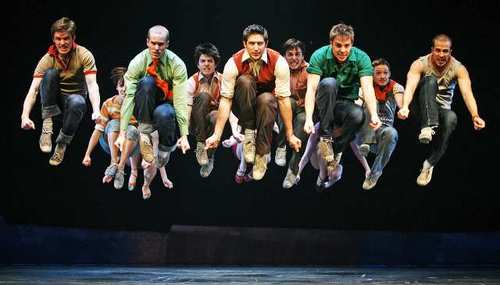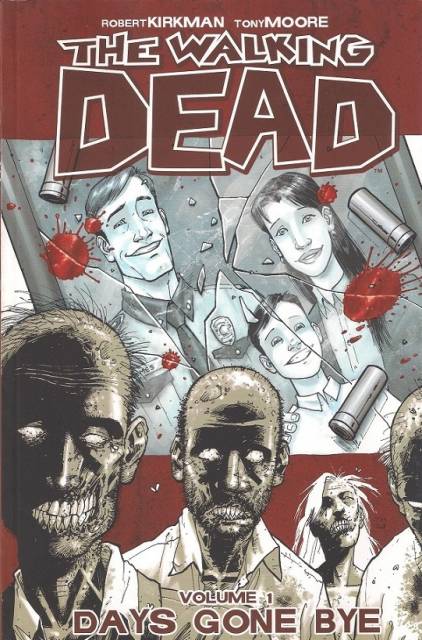Hate-filled speech in writing
During last night's episode of The Walking Dead TV show (season 2, episode 5 "Chupacabra"), the character of Merle made a pseudo-return to the show via fevered hallucination (I'll say no more to avoid spoilers) and in that appearance the character used a racial slur to describe the rest of the group that his brother Daryl is traveling with. This term was almost certainly aimed at the one black member of the group, T-Dog. One of my twitter buddies who also watches the show immediately commented on this:
I think we all remember that he was racist. Was that really necessary? #walkingdead
This is an important topic. Should writers use charged terms--hate-speech terms--in their fiction?
This brought me back to a "creative writing" course I took in university. The teacher was a published novelist which was exciting because most of the published authors on the school's staff were of nonfiction biographies and text books. The competition to get into his one class slot every semester was fierce and we all felt lucky to be there. Every week we'd pass around a short story written by a member of the class, read it, and come back the next week to critique it. It was during one of these critiques that this topic came up.
The student for that week --a white student, we were all white in that class and that was far from unusual at that university--had written a story involving a couple of skin heads who got into an altercation and threw out the same term as seen in the episode of walking dead. To say that our instructor was angry would be an understatement. He was livid. He was frothing. This was a man who usually shows less excitement and emotion than Lovie Smith on valium and he was hopping mad. The argument he made was this: by using hate-filled speech you are spreading hate-filled speech, that this is true even if you are portraying the speaker in a negative light, and to never, ever do this. Furthermore, that if you cannot get your point across without hate-filled speech, then you are not much of a writer and should quit now.
At the time, the student couldn't do much more than apologize profusely and do his best to sink into his chair and hide under the table. Later, when I asked him about it, he offered some explanation of intent. He wanted to portray a scene that was believable and "real" in tone. His story called for a gang of attackers targeting the protagonist and he wanted to portray a realistic gang, not a culturally diverse and politically correct "TV gang." He didn't want the cast of the music video for "Beat It." He wanted a believable portrayal of racism, not a polite, artistic clash in the style of the Sharks vs. the Jets.

If it wasn't clear already, I tend to side with my professor on this issue. As someone who has not personally faced sexism, racism, or other forms of bigotry, I feel that bandying about hate-filled terms would be ill-considered, improper, and--appropriateness aside--potentially alienating to segments of my audience. However, I can understand what my fellow student was going for, and I am uncomfortable with the blanket "never" that my professor put down. Even if my teacher meant specifically only for authors in a position of privilege concerning the language in question--in this case a room full of white students from the Midwest attending a private university when the issue is race--I do wonder if there are times when it can be appropriate. As usual when I have these kinds of questions, I looked for examples.
Examples: SNOW CRASH v. THIRTEEN
Two very excellent science fiction novels are Neal Stephenson's classic Snow Crash (1992) and Richard K. Morgan'sThirteen (2007). Both are dystopian-future stories set in a crapsack world where extreme cultural differences and corporate/government excesses have torn America apart. Both feature a black protagonist. Both are written in a hard-boiled style where sex and violence are portrayed bluntly and unsentimentally. Both are written by white authors. And both use charged, racist terms in dialogue. One major difference is that the former is considered a highly influential modern masterpiece while the latter is often seen as a bastion of bad science and unoriginality. And yet it's Morgan's work in Thirteen that I feel makes more defensible use of racially charged language. Let's look at each example. (Note: some spoilers from the first act of each book.)
SNOW CRASH
In Snow Crash, the protagonist (named "Hiro Protagonist," which is awesome) is half-black/half-Korean in ancestry but self-identifies as "military" in terms of his defining sub-culture. He's an expert hacker and one of the primary architects of the setting's version of cyberspace, having programmed its default combat system--an elaborate sword-fighting game. He starts out delivering pizzas for the mafia (yes, really) but winds up involved in a conspiracy involving an info-based weapon that can leave someone brain dead just from looking at an image. This book is a classic and many sci-fi books and movies have borrowed from it since. It was influential even in language, coining the term "avatar" in computing.
It's great. I highly recommend it. But see, there's one scene that I have never liked. Hiro (again, love that name) is on the run from his enemies when he stops off to regroup and refuel in a diner but happens to have picked the wrong side of town. A group of stereotypical redneck racists walk up to Hiro and make it clear they intend to do violence toward him (although it seems more like the narrator telling us than them showing any signs of this) and refer to him with hate-filled racist terms for both sides of his ancestry. Hiro's response is to pull out a freakin' katana and cut the man's head off, then run while his buddies are still in shock.
After Hiro's escape the scene is never referenced again.
THIRTEEN
Thirteen is Morgan's homage to (some would say ripoff of) Philip K. Dick'sDo Androids Dream of Electric Sheep? (1968)(aka Blade Runner) where instead of "replicants" we have a group of super-soldiers who were cloned Jurassic Park-style from ancient and purportedly more violent strains of humanity. The most successful of these strains--strain thirteen--was used to create hyper-efficient troops whose lack of "modern empathy" (supposedly an evolutionary preferred trait that was less common if not absent in pre-agriculture times) makes them incredibly dangerous in combat. Of course this led to paranoia among the populace and they banished all "thirteens" to a partially terraformed Mars except for one, a thirteen trained by the British military named Carl Marsalis, who won a lottery to be the bounty hunter who tracks down escaped thirteens.
The question of race is dealt with constantly throughout this book. Outside of the US its title was even The Black Man--a religious reference in context--instead of Thirteen. Where this becomes most clear is when Carl is arrested by the authorities in "Jesusland," a hyper-religious future-Confederacy that is apparently chock full of racists, where Carl faces discrimination based on his ethnicity for the first time (as opposed to his status as a thirteen). The author describes how, being thrust into that environment, the first time he had hate-filled speech directed at him he found it ridiculous and old-fashioned, "like being slapped with glove" (a major theme of the book is that genetics-based discrimination is the "new" racism), but quickly began to take it personally and develop hatred toward his attackers. It also describes a scene where he reveals to another black inmate that he is, in fact, a thirteen and how that changes the way that inmate looks at him.
This segment of the book ends with Carl enacting vicious revenge on the inmates who'd been assaulting him, on the day he's released no less. The book then moves on but comparisons between discrimination based on race and based on his status as a thirteen continue to be made throughout the rest of the book.
Comparison
The reason why I find myself more accepting of the use of this language in Thirteen than in Snow Crash is because--even if it holds to some unusual theories as far as the nature/nurture dynamic--Thirteen is thematically closer to dealing specifically with those issues than Snow Crash. It is about those issues and the strange ways in which humanity divides itself into "us" and "other." Just as one would be hard-pressed to write a story about, for example, the difficulties of growing up as an out gay boy or girl in high school without using any homophobic slurs in dialogue, when dealing directly with issues of racism it can be hard not utilize that language. The scene in Snow Crash by comparison seems to exist simply to throw another fight scene in, and that's it. Sure, it shows us that racism still exists but it does so with flat, stock characters that are introduced only to spout their hate-filled speech and then get beheaded. They're not actually developed, they're not actually a part of the plot, and the whole thing isn't really related to the core theme of the book. Because of this, it doesn't feel like the author is actually engaging the subject in any meaningful way. It's like it was added for "style" purposes rather than substance, and that's what bothers me about it.
WALKING DEAD and hate-filled speech
So where does Walking Dead fall into this dynamic of using it for style or using it for substance? The story isn't necessarily about race and racism, which initially makes me feel that it falls into the Snow Crash area, but anyone who tries to tell you it's just about zombies doesn't really get what's going on either. The story is about division among the survivors, and the racism of Merle is one way in which the group of survivors are divided. It's one of the ways the humans are shown to be "worse" than the zombie horde, who are united across all cultural divides in their lust for brains. That type of comparison is a central theme of the comic book and of the show. Does that make the use of this language justifiable? Necessary even? Or can you include that subplot without also including offensive speech?
I would argue that yes, you can. Or, at least, you can keep it to a strict minimum. The earliest introduction of Merle might have called for it, but even then we had him clashing directly--in a physical altercation--with T-Dog so I'm not sure the use of any specific racist term would be necessary to show that he's got a problem with T-Dog. Yes, it does serve to paint Merle as villainous and perhaps not deserving of our sympathies, but it's a touch heavy-handed. I don't think that enough is gained from using this term, especially in the most recent appearance, to justify its presence in the dialogue. The subplot of racism could have been introduced and been just as effective without. I honestly don't recall if the comic book ever used such terminology, but can't think of a time when I feel it would've been necessary there either.
What does everyone else think? Is the Walking Dead TV show justified in using explicit hate-speech terms? Are they necessary for the story they're trying to tell and the tone they're trying to set? Or do you agree with me that it perhaps shuffles a bit across the line of good taste? Let me know!

Log in to comment